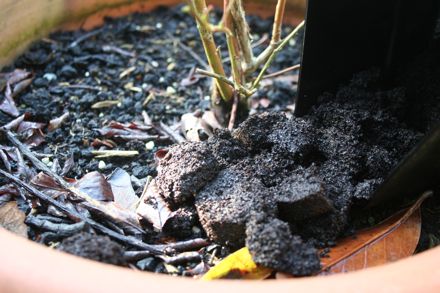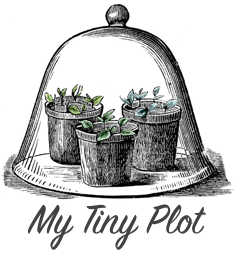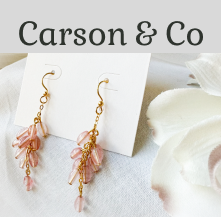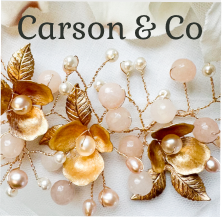Coffee Grounds & Blueberries

I usually throw my coffee grounds in with the kitchen waste and they eventually end up in the compost bin. Yesterday, however, after I’d made my morning coffee I looked at the grounds and thought, I know, I’ll put them on my Blueberries.
Why? well mostly because they make the soil look all black and neat like new compost, but also because I understood that coffee grounds, being acidic, would make a lovely mulch for my acid-loving Blueberries. Makes sense huh?
I mentioned this on Twitter and got a reply that said when you make the coffee (ie run water through the grounds) that all of the acid is washed away. I’m not a coffee ground expert and I haven’t done said experiments myself so I turned to Google to show me the way.
It seems there is some confusion in the matter. Some sites say that grounds are virtually neutral by the time they hit the ground making them nothing better than a good mulch and worm fodder. Other sites insist that these tests were flawed and that coffee grounds are indeed acidic.
Well, I for one, am confused. Should I be wandering around the garden in my slippers at 8am on a Saturday morning with a pot of used coffee grounds in my hand or should I just chuck em in the kitchen compost as usual.
I’m thinking if they are acidic then the Blueberries are loving it. And if they’re not then the worms are loving it instead and the Blueberries are like, “it’s about time the worms got something, they have a hell of time of it.” But I can’t really say either way.
And… who knew that coffee grounds could be so useful outside the garden?
 My Tiny Plot
My Tiny Plot



Have you got a soil test kit or pH meter? If you have, then you could test them out for yourself…
Mulching your blueberries with coffee grounds wont do any harm, as they will be somewhere between acid and neutral. What seems hard to find out is how to look after and feed pot grown blueberries. They need to be planted in ericaceous soil and are best watered with rain water, not tap water, but what should we use to feed them? I imagine they should be repotted every couple of years, but it is hard to find information. There is now an organic feed available for acid loving plants. Blueberries are quite an investment and I’m hoping that mine will flourish and bear fruit, lots of it, in the future.
I can’t imagine that running water thropugh anything would remove all of the acidity. If that were true then acidic soil wouldn’t exist in areas like the northern United States where blueberries are naturally found and they receive plenty of rainfall. For example blueberries grow naturally in Wisconsins acidic soil and they receive 30+ inches of rainfall annually. So seems to me some acidity must remain.
I have been mulching blueberries planted in the ground in a small amount of ericaceous compost with coffee grounds for about 2 years now. The blueberries are doing wonderfully, the worms love it, and it keeps the weeds down.
Several frugal people use the same coffee grounds for more than one pot of coffee. The coffee gets progressively weaker with each brewing. By that logic I think coffee grounds are still acidic until you have brewed them several times. Maybe not enough to make a pot of soil acidic but in conjunction with everything else it makes sense to add them to acid loving plant’s mulch.
rhodendron or azalea food is for acid-loving plants. I read they like pH between 4 and 7.
Well tea’s acid heh heh! Don’t you still drink tea in England? Litmus paper is an easy test for acidity and cheap.
I live in the South-west of France and they use coffee granules to get rid of ants. Apparently they (the ants) love them but they’re toxic for them. I have a soft spot for ants so haven’t tried it!
I put pine needles on my berry patch, they’re acidic, so I just strip and bag the pine needles from a christmas tree or two put out for collection after christmas. And coffee grounds I use as slug deterrent – apparently it dehydrates them so much that they die of it eventually. You just sprinkle it around a sluggy/snaily patch.
My wife runs a coffee shop, and we’ve been putting grinds around our blueberries since I got them last spring. I’ve heard that you have to be careful not to use too much coffee grinds in other parts of the garden because of the acidity -so i figured the blueberry patch was the perfect place for the excess. Glad I’m not the only one to try this out. I hope it works, as I much prefer using what would be waste to expensive high acid fertilizers.
I also agree that it makes sense that all the acidity wouldn’t be gone from the making of drip coffee. But it would also seem probable that boiling water on grinds isn’t entirely analogous to rainwater on soil.
Gill – can I completely change the subject (although technically fruit related…) and ask if your blight resistant tomatoes were any good? did they taste nice? do you have any recommendations? I had 5 varieties in various places around the garden and greenhouse and they all succumbed to the dreaded blight. (and I know its early, but this year I am planning properly!!!)
Hi Gill, you could make a crinoline from an old upturned hanging basket, should do the trick.
Does anyone know whether fresh or well-rotted chicken manure would be too acidic for blueberries? I have had no success with blueberries in my allotment but that may be because my allotment neighbour thinks that whatever she can pinch from mine is hers.
i don’t grow blueberries (yet) but i always feel good about putting the coffee grounds in the compost — maybe because, as you say, they look like good rich compost already! we even got our office collecting the coffee grounds and tea bags and once a week we schlepp those off for composting too!